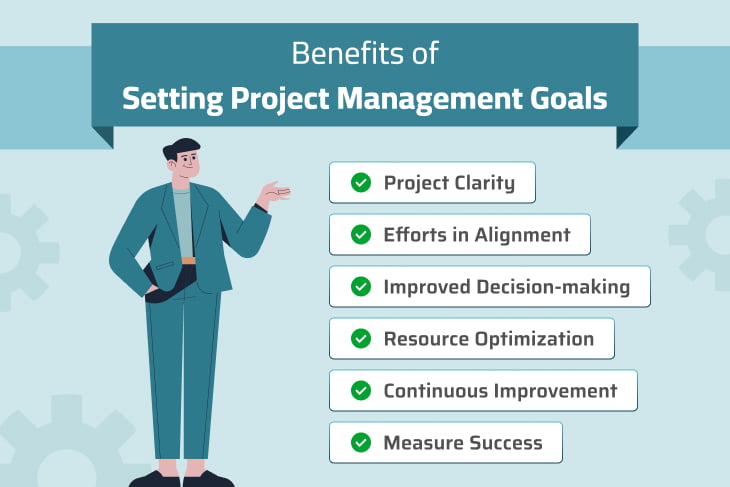Benefits of setting project management goals

- Project clarity: Clearly defined goals provide a shared understanding of the project’s purpose and objectives. This clarity ensures that every team member understands their role and contribution to the larger mission.
- Efforts in alignment: When everyone is working towards the same goals, collaboration becomes more effective, fostering a cohesive and synergistic team environment.
- Improved decision-making: When faced with choices or challenges, the team can refer back to the project goals to make informed decisions that are in line with the overarching project objectives.
- Resource optimization: Goals help in prioritizing tasks and allocating resources effectively. By understanding the critical path to achieving the project goals, project managers can optimize resource allocation and ensure that efforts are concentrated on high-impact activities.
- Continuous improvement: Regularly revisiting and refining project management goals allows for continuous improvement. Teams can learn from successes and challenges, adjusting goals as needed to optimize project performance and outcomes.
- Measure success: This makes it possible to measure progress and success objectively. Milestones and key performance indicators aligned with goals offer a quantifiable way to gauge project advancement.
Project management goals to achieve success
Define Clear Objectives
Clearly articulate the project’s objectives, outlining what needs to be achieved. This provides a shared understanding among team members and stakeholders about the project’s purpose.
Create a Realistic Project Schedule
Develop a realistic and achievable project schedule with well-defined milestones. Ensure that the timeline aligns with the project’s scope and constraints.
Establish a Budget
Set a budget that encompasses all project costs, including resources, materials, and contingencies. Regularly monitor and manage the budget throughout the project lifecycle.
Build a Competent Project Team
Assemble a skilled and well-balanced project team. Ensure that team members have the necessary expertise, roles are clearly defined, and communication channels are established.
Implement Effective Communication Plans
Develop and implement a comprehensive communication plan. Ensure that information flows efficiently between team members, stakeholders, and relevant parties to maintain transparency.
Ensure Stakeholder Engagement
Engage stakeholders effectively by identifying their expectations, communicating progress, and addressing concerns. Maintain positive relationships to garner support throughout the project.
Manage Risks Proactively
Identify potential risks and develop a proactive risk management plan. Regularly assess and mitigate risks to prevent disruptions to the project’s progress.
Adhere to Quality Standards
Establish and adhere to quality standards and benchmarks. Implement quality assurance processes to ensure that project deliverables meet or exceed expectations.
Encourage Team Collaboration
Foster a collaborative team culture where members work cohesively toward common goals. Encourage open communication, knowledge sharing, and a sense of shared responsibility.
Monitor and Evaluate Progress
Implementing monitoring mechanisms to track project progress against milestones and key performance indicators is important for project management goals. Furthermore, regularly evaluate performance and adjust strategies as needed.
Embrace Adaptability and Flexibility
Cultivate adaptability in the face of changes. Develop a flexible project plan that allows for adjustments without compromising overall project goals.
Facilitate Knowledge Transfer
Promote knowledge transfer within the team to ensure that insights and lessons learned are documented and shared. This contributes to continuous improvement and better decision-making.
Conduct a Thorough Project Closure
Execute a comprehensive project closure, including an assessment of goals achieved, lessons learned, and stakeholder feedback. Furthermore, ensure a smooth transition and handover of deliverables.
Conclusion
As projects continue to grow in complexity and scale, the significance of goal-setting is increased. It is not merely a procedural step but a strategic imperative that influences every aspect of project execution. With well-defined project management goals, project teams can measure progress, mitigate risks, and celebrate achievements, ultimately delivering projects that meet or exceed stakeholder expectations.

